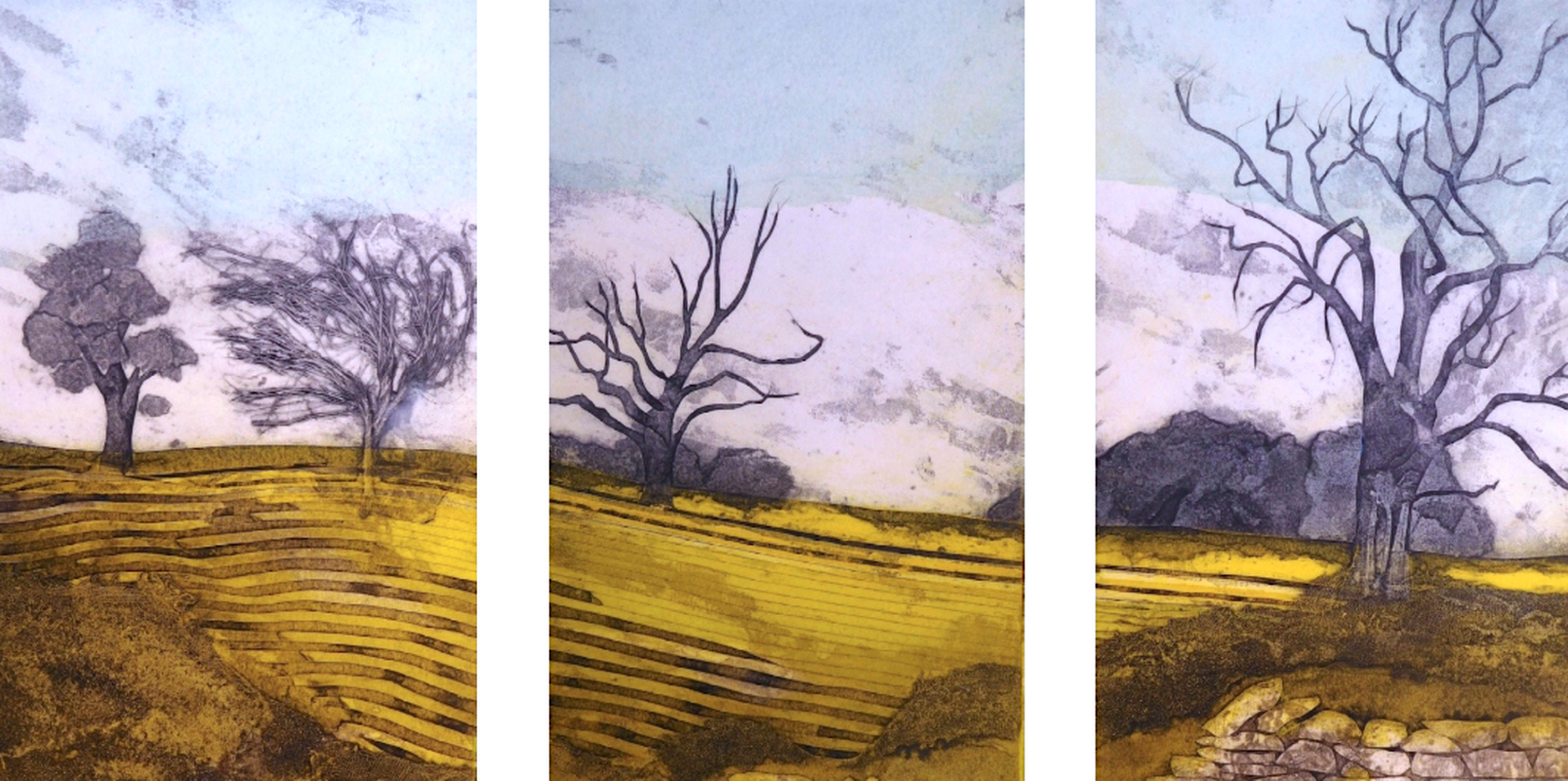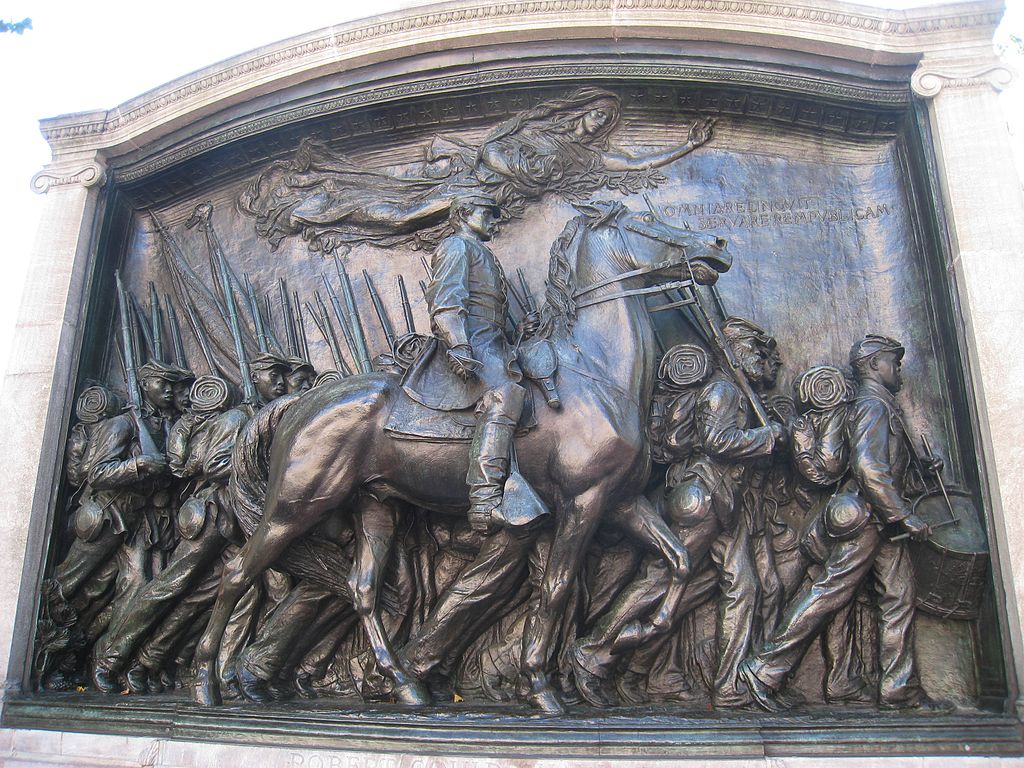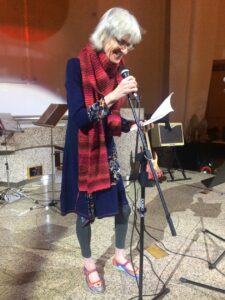
SARAH ROSS-THOMPSON AND THE ART OF COLLAGRAPHED PRINTS
I interviewed artist Sarah Ross-Thompson whose exceptional Collagraphed prints use fabrics, lichen, porridge and string to create images of the dramatic Scottish Highlands where she


Poetry is a cage with an animal inside… it has a wild longing for clarity – Derek Mahon.
Is it possible to write poetically about war and violence? To me, the word ‘poetically’ means there is something beautiful, ordered or fitting about the words, and that we experience the horror but see beyond, or more. Typically, in times of crisis the poet writes elegies, but often with controlled passion such as Yeats’s Easter 1916. In this kind of work a form of distancing over time has allowed the poet to find the exact words to nail the experience. It rises above the immediate moment while retaining the fine detail of personal connection:
![Mcdonagh[1]](http://leslietate.com/wp-content/uploads/2016/07/Mcdonagh1.jpg)
MacDonagh and MacBride
And Connolly and Pearse
Now and in time to be,
Wherever green is worn,
Are changed, changed utterly:
A terrible beauty is born.’
From Easter 1916, W B Yeats
Poetry is often about positioning: finding a set piece strong enough to contain experience. We relive the nightmare in Wilfred Owen’s Dulce et Decorum Est, and the words are savage, but the narrator retains control. The description is exact and camera-like, taken in extreme close-up, so we experience every detail of the gassed soldier’s agony. But the choice of words is surprising, reminding us that this is real not some horror/darkness fantasy, and there is a rhyme scheme and syllabic count. It’s intensely personal, individualised and subjective while retaining technical control, medical precision and a deep wide aching humanity based on the sufferings of Christ.

‘If you could hear, at every jolt, the blood
Come gargling from the froth-corrupted lungs,
Obscene as cancer, bitter as the cud
Of vile, incurable sores on innocent tongues,—
My friend, you would not tell with such high zest
To children ardent for some desperate glory,
The old Lie: Dulce et decorum est Pro patria mori.’
From Dulce et Decorum Est, Wilfred Owen
Times of crisis can be accompanied by new poetical movements. So The Romantics came together at the time of the Industrial Revolution and the Napoleonic Wars, and Seamus Heaney, Derek Mahon and Michael Longley found a voice during the Northern Irish ‘troubles’. But the purpose of these poets was always wider than the conflict of the times. So their writing draws on the past, matching events from mythology, literature and history with their current experiences. They make us relive our griefs and passions and celebrate that peculiar, driven creature who is homo sapiens at our best and our worst. And they can all transport us to that sacred, interior space where the disembodied voice of the teller speaks quietly of who we are when stripped of all pretence.

Poetry takes in all of what makes us human. It sees the tragic and absurd, it honours our weaknesses and gives us hope that we will heal and recover – because, yes, most of all poetry is about damage and healing. So there is a great weight of passion in Robert Lowell’s confessional visions of lost America and the turmoil of his own personal life. His poetry corresponds to the beauty, chaos and wild ambition of capitalism while holding onto that still small voice of humanity at the centre, the wounded child, the drinker, the mentally afflicted outcast and believer. Like Colonel Shaw in the Civil War:
‘He has an angry wrenlike vigilance,
a greyhound’s gentle tautness;
he seems to wince at pleasure,
and suffocate for privacy.
He is out of bounds now. He rejoices in man’s lovely,
peculiar power to choose life and die…’
From ‘For the Union Dead’, Robert Lowell.
Lowell’s voice is intensely alive while being in close touch with the dead. As a child of the 60s he was aware of the racism implicit in his hero Colonel Shaw leading black troops to their death. You can hear this in a recording of him reading ‘For the Union Dead’ where he stops to point out that the n-word was “His word not mine.”
Lowell’s ‘state of the nation’ poetry leads on to poets of identity and crisis such as Aimé Césaire and Adrienne Rich who explore inner and outer oppression – poets who speak from the heart, with discipline, exploring the dream experience as well as the rationalised dramas of life.
So is there a role for poetry in times of crisis? My answer is that poetry is about crisis, both small and domestic and largescale in the body politic. Poetry links the two, sometimes by contrasting our innate decency with the horrors of war and sometimes by sharing the thoughts that ‘lie too deep for tears’. It has a role to connect us with being rather than doing, compassion rather than revenge, understanding rather than repression.

I believe the poetry of crisis speaks to us all, often in the form of elegy. For me it touches on the people I’ve known, now dead. I’m fortunate not to have lived through wars and massacres but I’ve experienced losses. So, for me poetry is a dialogue with death and bereavement; it explores that mysterious other country which forms the background to much of modern poetry.
In the poem that follows, I wanted to capture the removal to ‘somewhere else’ as well as the ever-present ‘now’ of death. The particular, individual loss that sparked the elegy was the death of a computer-teaching colleague who was a biker with an interest in semantics. He was clever, large-bodied and died young.
Obit acole@merton.ac.uk
15th March 2004
1.
This morning
Shifting quietly, haloed by the sun,
Stirred, like tides, by some far-off persistence
Your mind returns
To float up memories on your grey-grained screen
Dayspring and youth recycled from the server
As you fill out the room ─
Reflections of self
Channelled from the depths of an ancient pool
Where, big-screen, centred, your afterimage sits
Larger than life
Like a contented Bodhisattva.
2.
R U now with Spock
Quartering the pixels of dead black space
Or suited, crusading, descended from the gods,
The ghost behind the camera, signalling earth
In that screensaver spread
Of first foot on the moon?
Or stepped out a moment, cruising the archives
With Steppenwolf and Chomsky
To joyride your own track,
Then flung from the wheel to twilight and stop
With those who went before?
Yet still you travel on, day by day,
Through birdsong, stirrings and reawakened earth
As you coast up from dawn,
Stepping from your car, one world to the next,
To arrive online
Where, red shift across time,
Your mind looms large
From some far-back light source,
Logged on to greatness
From the quiet of your room
Contemplating all our messages.
Leslie Tate
This blog is a companion piece to Marilyn Kallet’s guest appearance last week, writing about the same subject. You can read it here.
ABOUT LESLIE TATE’S BOOKS:

I interviewed artist Sarah Ross-Thompson whose exceptional Collagraphed prints use fabrics, lichen, porridge and string to create images of the dramatic Scottish Highlands where she

Part 2 of my interview with Mark Statman looks closely at Mark’s Latin American poetic influences, his life in Mexico and ends with an extract

I interviewed international poet and translator Mark Statman about Volverse/Volver, his 14th published collection. Mark, who has won national arts awards, is Emeritus Professor of Literary

I interviewed Lisa Dart, finalist in the Grolier, Aesthetica and Troubadour Poetry Prizes and author of The Linguistics of Light (poems, Salt, 2008), Fathom (prose

I interviewed writer Julia Lee Barclay-Morton about her experience of autism. Julia began as an experimental dramatist in New York, moving to the UK to
| Cookie | Duration | Description |
|---|---|---|
| cookielawinfo-checkbox-analytics | 11 months | This cookie is set by GDPR Cookie Consent plugin. The cookie is used to store the user consent for the cookies in the category "Analytics". |
| cookielawinfo-checkbox-functional | 11 months | The cookie is set by GDPR cookie consent to record the user consent for the cookies in the category "Functional". |
| cookielawinfo-checkbox-necessary | 11 months | This cookie is set by GDPR Cookie Consent plugin. The cookies is used to store the user consent for the cookies in the category "Necessary". |
| cookielawinfo-checkbox-others | 11 months | This cookie is set by GDPR Cookie Consent plugin. The cookie is used to store the user consent for the cookies in the category "Other. |
| cookielawinfo-checkbox-performance | 11 months | This cookie is set by GDPR Cookie Consent plugin. The cookie is used to store the user consent for the cookies in the category "Performance". |
| viewed_cookie_policy | 11 months | The cookie is set by the GDPR Cookie Consent plugin and is used to store whether or not user has consented to the use of cookies. It does not store any personal data. |
6 responses
This is an excellent article.
Thank you Helen, that’s very kind of you. Leslie x
Rereading, rediscovering this essay. It’s rich, elegant and very much to the point. Thank you!
Thank you for rereading! ‘Poems are twice-lit, as Antonio Machado says – once for the straight reading, once for the slant.’ Don Paterson.
A beautiful post. Your mind is a garden sprouting rich, lovely colors.
Thank you Robin. Sue and I love visiting gardens – they’re so sensual. When we walk by borders it has a trance-like effect.